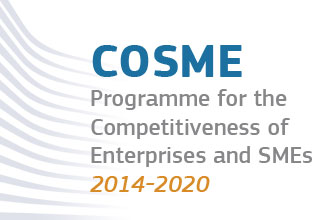 newsitems
newsitems
newsitems
Wikileaks' Assange may ask ECHR Urgent Measures to Stop Jail/Extradition Strasbourg sources indicate
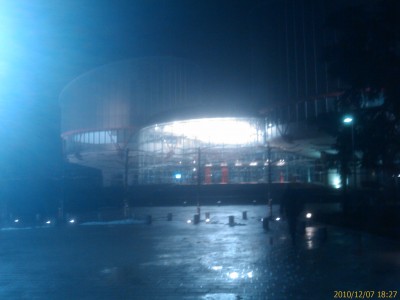
Controversial Wikileaks' founder Julian Assange, who was arrested by Brittish Police after publishing a series of US classified documents focusing on Foreign Policy, could try to urgently ask from ECHR to order "Interim Measures" in an attempt to Suspend his imprisonment, expulsion to Sweden and/or extradition towards the USA, in addition to an eventual complaint contesting the coercitive Action taken against him at the demand of Swedish Authorities, Strasbourg's sources indicated to "EuroFora".
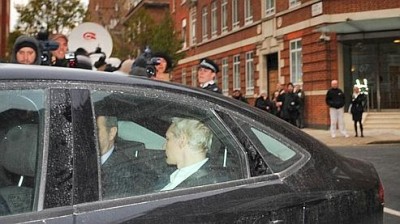
According to Article 39 of ECHR's Rules, it "may .. indicate ... any Interim Measure which it considers should be adopted in the interests of the parties or of the proper conduct of the proceedings before it". ECHR notifies his Decision to CoE's Ministerial Committee, and "may request information" from the respondent Member State "on any matter connected with the Implementation of any Interim Measure it has indicated".
This has been used by EuroJudges several times, mainly in order to prevent risks to provoke irremediable consequences against personal liberty or life, and protect from dangers of inhuman/degrading treatments, etc, particularly on People threatened by Jail, expulsion and/or extradition, etc, ECHR's sources earlier explained to "EuroFora".
CoE's Member States normaly respect such ECHR's decisions ordering them to take some "Interim Measures". - "Where a party fails to comply with an order of the Court concerning the conduct of the proceedings, (ECHR) may take any steps which (it) considers appropriate", EuroCourt's Rules' Article 44B on any "Failure to comply with an order of the Court' adds.
In such a complaint, Assange's Lawyers might invoke ECHR's articles 5, 6 and 10, on personal Liberty, Fair Trial and Freedom of Expression, and eventually 3, for prevention of risks of degrading treatments (f.ex. in case of extradition to the US), etc.
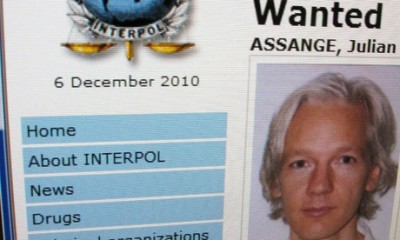
This goes even if "Wikileaks"' latest methods to massively publish copies of classified US documents on foreign relations, were strongly criticized by many Governments and some Journalists. Reported contradictory comments generally went from congratulations (f.ex. by NY Times) to condamnations (f.ex. by White House's Spokesman Gibbs), or even suspicions for US attempts to manipulate public opinion...
But, at any case, both his Lawyers, Mark Stephens and Jennifer Robinson, reportedly are "intending to dispute those proceedings on all grounds", Guardian observed since yesterday night.
However, in case their eventual demand to suspend extradition and/or imprisonment might be, perhaps, accepted by ECHR, this would not mean at all that Strasbourg's EuroJudges would necessarily agree also with Assange's main complaint against the prosecution.
That independent issue, which is a question on the substance of Human Rights, and not only on urgencies about procedural matters, should be normally examined by ECHR according to its usual principles, which often (but not always) include a Public Hearing in Strasbourg, and conclude, after instruction and exchange of written memorandums, etc., in a Judgement which is published after an average period of some 2 Years time, and can be attacked to ECHR's Grand Chamber during the next 3 Months
--------------------------
Thoughts to eventually apply to ECHR might explain why Assange, who is Australian, preferred to stay inside a European area covered by the PanEuropean Convention on Human Rights.
---------------------------
Speculations mounted higher when, the same Day and even Hours that Assange was taken into custody by Brittish Police in London, ECHR suddenly cancelled a scheduled Public Conference of its President, professor Jean-Paul Costa, with the man who is behind the Historic opening of Individual Applications to ECHR since the 1980ies : former French Minister of Justice and President of the Constitutional Court, Robert Badinter.
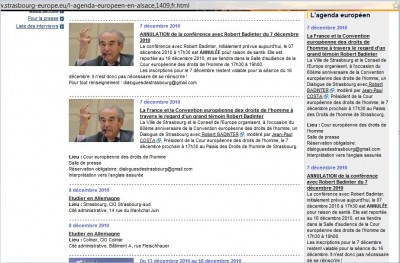
The cancelled event had been initially anounced for today, Tuesday, 7 of December, between 5.30 and 7 p.m.. I.e. practically at the most probable period of Time for eventual ECHR deliberations if Assange had lodged an urgent application here...
Almost all key ECHR Officials in this regard were totally unreachable by Phone immediatly after this period of time elapsed, "EuroFora" observed". A fact which is quite unusual, at least some of them using to stay often during late afternoon/early evening at their office.
Strasbourg's Journalists were informed of the cancellation by an E-mail sent by the city's Press Club on early afternoon, 2.47 p.m..
The refusal, by a Brittish judge, of Assange's demand to be released on bail, and the fact that he was subsequently taken into custody by U.K. Police was largely anounced and afterwards confirmed by many NewsMedia today, between 11:30 a.m. and 4 p.m., after presenting himself to the Brittish Authorities reportedly on 10:30 a.m., while his possible presence in the UK and eventual visit to the Brittish Police with the intention to be released on bail, had been already evoked previously by "The Guardian" since Monday evening.
-------------------------------
The obligation undertaken by all CoE's Member Countries to accept ECHR's jurisdiction is reportedly one of the main reasons for which the USA did not even ask to become a new CoE's Member when Russia was ready to accede, back on 1995, preferring, on the contrary, to get a "Special Status", as Canada, Japan and Mexico, etc. inside the PanEuropean Organization, which has several of its Legal Conventions open to International accession from Countries all over the World, as, f.ex., the Oviedo Convention on BioMedicine and Human Rights, the only legally binding international instrument on BioEthics.
------------------------------------------------------------------------
Swedish Police, which issued a EuroPol arrest warrand against "WIkileaks"' founder, reportedly claimed, later today afternoon, that it doesn't intend to extradict him to the USA., and that he was wanted for "an enquiry which has no relation at all with Wikileaks".
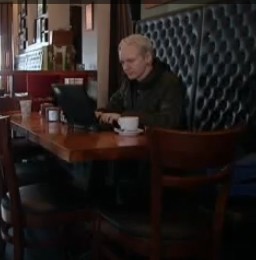
But, even if anyone could believe that this might be a pure "coincidence", nevertheless, according to ECHR's case-law, Assange, who was reportedly awarded by "Amnesty International" a 2009 New Media prize for disseminating informations on killings, after receiving in 2008 also "Economist"'s "Censorship award", could certainly raise at the ECHR a complaint for violation of the Freedom of Expression, (Article 10 of the PanEuropean Convention). This naturally goes even if he reportedly doesn't receive any salary from his participation to Wikileaks publications, (a fact which, according to some corporatist, narrow old views of certain groups in France and a few other countries, would be opposed to their conception of "Journalism", that they identify merely with a cheque regularly payed to anyone, whatever he might do, by a business having a "Media" title. On the contrary, ECHR protects Journalists' "Freedom of Expression" by checking what one really does : I.e. if he/she strives, even by facing dangers and/or making sacrifices, to find and publish critical and original Informations on serious issues of general interest for the Society.
The only imaginable objection seems to be that "Wikileaks" simply publishes raw Documents as such, and doesn't edit its publications, nor writes Newstories, contrary to normal Journalism : Something which implies, according to Journalistic Deontology, to check the veracity of various sources, investigate and collect all pertinent infos related to a concrete issue, select only those data which appear pertinent, present also the claims of each party in case of controversy, and warn the reader about what is really at stake, etc.
--------------------------------------------
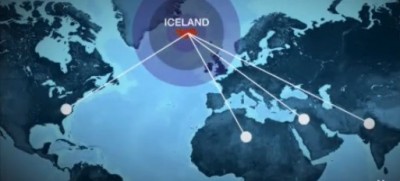
It's an obvious Paradox, however, that Wikileaks' founder is technically persecuted Today by the police of Sweden, i.e. the country which has a so long tradition for protecting Transparency and Freedom of Expression in its History, that Iceland, Assange's reportedly favorite place, where he "could feel safe", has even inspired itself largely from the Swedish Press legislation in order to draft the new, famous "IMMI" ("for Icelandic Modern Media Initiative") project to pass all necessary Legislative Bills for dissident NewsWebsites of Investigative Journalists to be able to publish critical News freely, with less restrictions than anywhere else in the World,
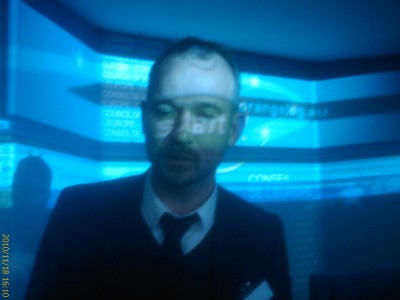
as former President of Iceland's Union of Journalists, current MP Robert Marshal, recently told "EuroFora" at the CoE in Strasbourg, on the proposal tabled by Citizens Movement's MP leader Birgitta Jónsdóttir and reportedly "supported by 2/3 of MPs" from all parties.
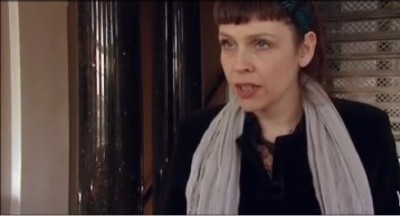
The fact that ECHR's current Registrar (i.e. Head of the Court's secretariat and staff) is also of Swedish origin (the experienced Erik Fribergh), obviously would add some more peper in this case, even if all ECHR's Officials are traditionally supposed to be independent and objective.
However, it's also a fact that, despite a growing opposition among Swedish and, more largely, European Union's People, the current Swedish Government
still remains notoriously favorable to Turkey's controversial and impopular EU bid, following USA's views on this point, while Assange has, for the 1st time, put Turkey as the No 1 area of origin for the greatest Number of Documents recently published by "Wikileaks" !
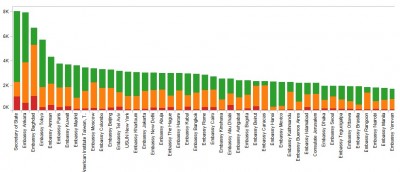
Moreover, mainstream NewsMedia largely echoed "Wikileaks"' revelation of a strong Criticism vis a vis Turkish Prime Minister Tayip Erdogan, reportedly about "corruption" issues, in a Report sent by American Ambassador Edelman claiming, on December 2004, that, according to at least two sources, Erdogan had 8 unexplained Accounts in Swiss Banks, and that (current Turkish Foreign Minister) Davutoglou would be "extremely Dangerous", in relation to alleged Islamist aims....
To which, Erdogan reportedly replied angrily, accusing the USA to be "responsible" for what its former Ambasador denounced, (accused of "slander", "lies", etc), claiming, in reply, that he does "not have a penny in Swiss Banks", as he said on December 2010.
Meanwhile, nevertheless, US Ambassador Eric Edelman, who, after 3 Years of post in Turkey, was suddenly incited to become critical vis a vis the Turkish Prime Minister just after the 2004 US Presidential Elections, was promoted to the Top Job of US Defense under-Secretary of State for policy, immediately after criticizing Erdogan, for the period of 2005-2009.
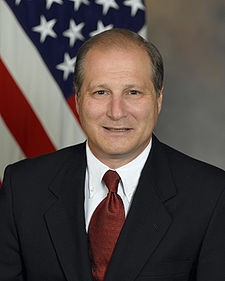
However, USA Ambassador's and Erdogan's claims are not really contradictory, but could, in fact, stick together : Indeed, if Erdogan really had 8 Accounts in Banks in Switzerland back on 2004, as Edelman denounces, then, it isn't theoretically excluded that he might have spend them meanwhile, so that today, on 2010, he really "doesn't have a penny in Swiss Banks" , as the Turkish Prime Minister reportedly claims now, simply because no more money would have been left after 2004...
The Question obviously raised in such a case, obviously is : - "To whom, and why, might Erdogan have given all that Money (if it really existed) out of his (reported) Bank Accounts in Schwitzerland on 2004 ?"
As an "EuroFora" Forum's member ("jvj") earlier observed yesterday (Monday afternoon, December 6), under the Heading - "Wikileaks: Where did Erdogan spend his alleged "8 Swiss Bank accounts" of 2004? " :
"... Speaking of "serious Corruption" in Turkey, the U.S. Ambassador's Letter, dated from 2004 and revealed by Wikileaks in 2010, says that : " We have heard from 2 contacts that Erdogan has 8 accounts in Swiss banks".
- "I do not have one penny in Swiss banks !", angrily replied the Turkish Prime Minister Yesterday, ...on December 2010, (i.e. more than 6 Years later),
The Turkish PM also asked from the U.S. to "call to account" its diplomats", and accused the U.S. Ambassador of "slander", "Lies", and "Inaccurate" claims. A U.S. apology for cables alleging financial improprieties was insufficient, Erdogan reportedly added, accusing Obama's "United States (to be) responsible for those diplomats' false claims and their smears".
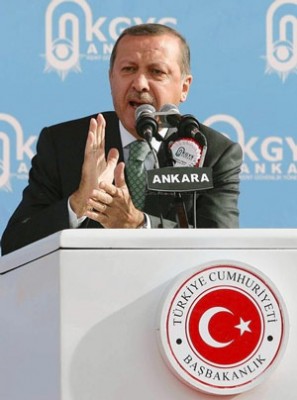
>>> In consequence, assuming that both tell the Truth, the question raised, obviously is : - "Where did Erdogan spend the Money of his reported 8 Swiss Banks accounts of 2004 ?", (since "not ... one penny" wasn't left in 2010 : see above) ?
And, by the way, : - Why in Switzerland, back in 2004 ? Did any exceptionaly important event for Turkey's interests take place in that Country at that precise Year ?
May be such elementary clarifications could help reveal where the Money of Erdogan's alleged "8 Swiss Banks Accounts" that he had "in Switzerland" on "2004", and which mysteriously disappeared afterwards (See above), might have gone..."
In fact, the only notoriously known "exceptionally important event for Turkey's interests" in Switzerland on 2004 was the famous UN-sponsored Top Political Talks on Cyprus' issue at Burgenstok (near Luzern), which concluded without an agreement, but with an imposed controversial (mainly because of alleged Refugees/IDP's Human Rights' neglect), 5th Version of a Draft Plan prepared by a team of Experts hired by a UNO's former under-Secretary, former Brittish Diplomat, reportedly speaking fluently Turkish but not a word of Greek, who had been appointed inside UNO's Secretariat back in 1998 by former Brittish "New Labour" Prime Minister Blair (the controversial Iraq War inciting politician), but was fired by UNO's f. Secretary General Koffi Annan on Summer 2005, (apparently after learning personally some "spicy" Facts by a visitor on July 2005).
Annan tried to rectify UNO's Secretariat stance by taking a closer look personally on Cyprus, later from September 2005, when he hired New key staff among People who had his own trust, f.ex. appointing as New UNO Director for Political affairs Ismail Gabarit, that "EuroFora"s co-founder met for an Interview at New York, on the sidelines of UNO's Reform Summit of Heads of State/Government : A kind and objective person, famous from his earlier job as former Head of UNO's Mission for the Monitoring of South Africa's End of Appartheid, who sincerely attempted, and partly succeeded, in the few Time available before he retired, to start ameliorating somehow the personal contacts between Greek and Turkish Cypriot leaders.
But, meanwhile, that controversial, imposed 5th Version's of former UNO Secretariat Agents' Draft notoriously failed in a Popular Referendum in Cyprus, with more than 75% of People voting against it on 2004, obviously giving, for the 1st time in History, the impression that Turkey would have ceased to be obstructing at least one formally "UN" proposal.. Contrary to what repeatedly did many times in the Past Ankara's successive governments and their protegé former Turkish Cypriot leader Rauf Denktash in the Occupied Territories of Cyprus controlled since the 1974 Military Invasion by Ankara's Army, by refusing all other UNO's Drafts.. Even droping an official UN SG Koffi Annan's invitation to start Talks for Cyprus' ReUnification "on the basis of UNO Security Council's Resolutions" in New York on September 12, 2001 : Refusal which was practically covered up by the 9/11 Mass Deadly Terrorist Attacks). Naturally, all this gave a boost to a Turkish lobby pushing for Ankara's controversial EU bid, precisely at the moment that Ankara needed in order to convince the EU to decide to start lucrative "Accession Negotiations" (December 2004). This provoked the well-known "No" of French and Dutch People in the 2005 Euro-Referenda which blocked Europe's institutional development for many Years, until France, at first, and Germany's recent refusals to Turkey's impopular EU bid, as well as growing Popular Opposition in many other EU Countries, succeeded to unblock EU's New Lisbon Treaty, which entered into force just 1 year ago (12/2009).
-------------
Curiously, contrary to a traditionally strong and continuous EU Presence, with a Special EU Council's Envoy for Cyprus' UNO-sponsored Talks, as early as since 1997 already at the Montreux/Glyon Talks during the Irish EU Chairmanship, for the 1st time, "EuroFora"'s co-founder had been astonished to find at Burgenstock on 2004 that, this time, nobody was present there on behalf of the EU, despite Cyprus' imminent accession as new EU Member and Turkey's controversial EU Accession bid between 1999-2004.
The only EU presence at Burgenstock (Switzerland) on 2004 was a brief Helicopter visit, only at the last moment, by former EU Commissioner on Enlargement Verheugen, a "Socialist" politician notoriously favorable to Turkey's controversial and impopular EU bid, who attracted later much criticism by reportedly claiming that ..."Torture in Turkey is not systematic" (sic !), and is currently hired and paid by Turkey's Trade board, as a Cyprus' MEP, Antigoni Papadopoulou (herself member of the Socialist Party in EU Parliament) denounced in a critical question to EU Commission's President Jose Barroso, who replied in 2010 that a check for eventual incompatibility or conflict of interest was, indeed, made recently in Brussels, without, however, finding a legal obstacle to Mr. Verheugen's personal financial deals with the Turkish Trade board business.
But, despite today's reported statements that Publications of US documents would continue despite Assange's arrest, "Wikileaks" apparently won't have enough time to find and publish any "spicy" data on such recent developments...
And, given Turkish Prime Minister Erdogan's anger over "Wikileaks"' recent revelations, which also include the same reported US cable's claim that current Turkish Foreign Minister Davutoglou was seen as "extremely dangerous" (see supra), it obviously cannot be excluded that the fact that Turkey currently holds CoE's rotating Chair of its Committee of Ministers during the November 2010 - May 2011 period, might influence at least some ECHR's agents negatively vis a vis any Assange's Lawyers' eventually urgent demand for protection from jail/extradition....
Unless ECHR feels that it should, on the contrary, make a striking demonstration of its independence, even before Ukraine takes over CoE's next chairmanship on 2011's spring.
It remains, however, to be examined if "Wikileaks" is really the right area for such moves, or not.
At any case, ECHR, if it's really called to pronounce itself, it will obviously have to carefully find a way to defend its principles without being manipulated by anyone.
Strasbourg University Head Beretz to EuroFora: Science, EU +Franco-German core comparative advantage
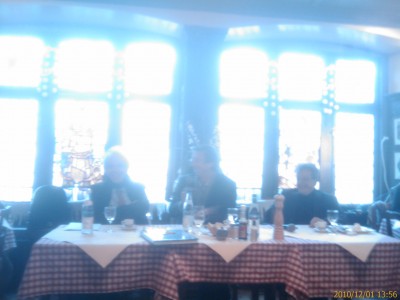
Europe and Franco-German cooperation are, together with top Science "dynamic" excellence, key Competitive Advantages in Strasbourg University's candidature for the biggest ever long-term funding possibilities created by the "Great Loan", for "Investments of the Future", mainly "Initiatives of Excellence", aimed to help make the Universities which will be selected among the Best in the World, as anounced by French President Sarkozy December 8, 2009, at nearby Geispolsheim (See "EuroFora"'s NewsReport from the spot), "UniStra"'s President, professor Alain Beretz replied to "EuroFora"s questions at a meeting organized by Strasbourg's Press Club.
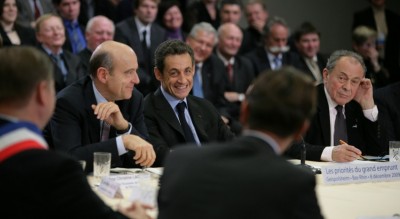
- "We have identified the Franco-German cooperation as being at the Heart of our Actions", replied Beretz to "EuroFora", and we must have enough bricks inside a Toolbox with an excellent overall coherence, in order to win the competition, he added.
- The main interest of the "Investments for the Future", in addition to their volume, even if this might be partly compensated by Economies made elsewhere, is that they are Long-term capital dotations, Beretz practically observed. But ... at a stage of "pre-selection" of projects, to be officially presented at the beginning of January 2011, in view of final decisions during next year, spreading all over the next 1,5 Decade, due to invest in Top Research some 22 Billions € in all.
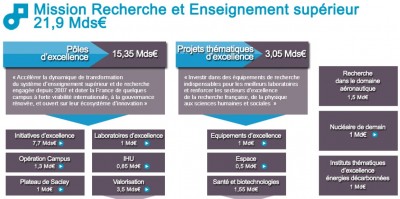
- "EuroFora"s 1st Question to UniStra's President, observed the fact that, concerning "Investments of the Future", among the Criteria highlighted by the Ministry of Research are "Attractivity" and "European/International impact", as well as a strong concentration gathering together the potential of many elements or "bricks" in a coherent whole, (as you said yourself). Which are Strasbourg's main Comparative Advantages compared to other (French) Universities, from these points of view ? (Nearby German Universities of) Karlsruhe and Freiburg. that you've already cited, could they be valorized, in one way or another? And as far as it concerns "grouping together", in addition to the well-known "Bio"-pole (Health, Bio-Materials, Natural environment, etc), which is obviously a No 1 advantage, do you think that we could use also a pole which could be named "Europe", (f.ex.with the "PEAP : "European pole on Public Administration", which gathers together Public Law, Political Science, Economy, Public Sector Management, etc., including the prestigious"ENA School" for CEOs, DIplomats, etc. in the Public Sector, which could gather around the federating concept of Good Governance). There is also Space (f.ex. UniStra-cooperating International Space University, etc), together with our German friends (f.ex. nearby Stuttgart-based Company which won the EU bid on Satellite Navigation System GALILEO 1st series of launch), nearby Dartmund-based ESA Operation Centre, Earth Science Observatory (with a World-famous Seismologic research centre), etc. which coexists quite well Health research f.ex. at the Illkirsh-Grafenstaden site, (etc) ?
----------------
- "Now, on (Strasbourg University's) Competitive Advantages, it would be too long to reply (in full to "EuroFora"'s main question), so I'll focus on Principles", Beretz reacted :
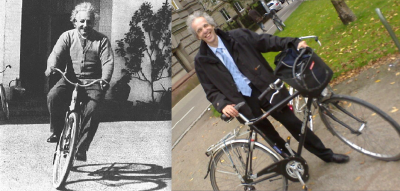
- "There are certain domains of excellence, in terms of Science, and you cited some of them, they are well known, it's in BioLogy, Chemistry, as you said, but also in Human Sciences, in Europe as a subject (area) of research".
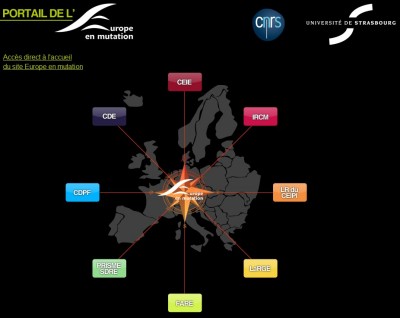
- "It's easy to dress a list, which is based not only on wishfull thinking but mainly on objective elements (data) to analyse", as he said, apparently including, thus, also the "Materials" and "Optical" Science domains, which are among the most important in Strasbourg, as even Paris' Nobel winner in Physics, Cohen-Tanudji, has earlier told "EuroFora"). - "I won't unfold all that List now, but what I've just cited are the Best examples, f.ex. Chemistry", (including Strasbourg's Nobel Prize winner prof. Lehn, etc), which is notoriously cooperating also with Physics, (f.ex. in IPCMS : Institute of Physics-Chemistry for Materials, ICS : Institute Charles Shadron on macro-molecules), Biology/Health, etc.
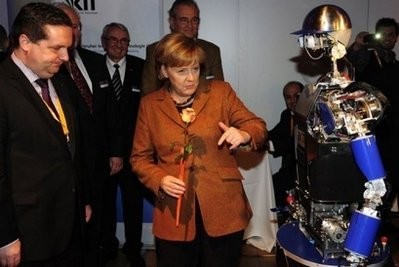
- But, "other Excellence points are also related to Strategy and Location : And there, we (Strasbourg's University) have the Franco-German" factor, President Beretz went on to add, (apparently including in this GeoPolitical point of view also Switzerland, participant in EU's Research programs and member of the Superior Rhine/OberRhein area, particularly well organized also on the Education/Research dimension, as Karl-Heinz Lambertz, a longtime PanEuropean Specialist on TransBorder Cooperation, Chairman of Council of Europe's Local/Regional Authorities' Culture-Education Committee, and Prime Minister of the German-speaking Minority in Belgium, recently told "EuroFora").
- In this regard, indeed, as "EuroFora" had suggested (See supra), we (Unistra) have identified the Franco-German cooperation as being at the Heart (Core) of our Actions : It's not difficult to organize, f.ex., if we make 100 salaries for Doctorants, we reserve 10 or 15 (we haven't decided yet) to PhD. Thesis prepared in cooperation with German Universities", Beretz proposed.
By the way, even the wording "Initiatives" + "Labos" of "Excellence", used by the Great Loan-funded big calls for tenders made by France's Ministry of Research/Universities, was chosen by France and Germany alike, and Strasbourg's neighbours at Karlsruhe (where is located the famous "KIT", that EU Energy Commissioner, Gunter Oettering, has presented in his EU Parliament's 1/2010 Hearing as destinated to become "a European MIT", compared to USA's famous "Massahussets Institute of Technology"). French Minister for Research and Higher Education, Valerie Pecresse, has already expressed her wish that UniStra develops quality cooperations with the neighbouring German and Swiss Universities, such as Karlsruhe, Freiburg and/or Bale, as she has earlier said to Journalists in Strasbourg, including "EuroFora".
-Already, "on Cooperation with the (nearby German) Universities of Karlsruhe and Freiburg there are, already, many individual projects", and "we can facilitate the augmentation" of their number, f. ex. " boosting conditions favoring Tri-linguism, i.e. developing German Language after French and English, (a favorite, long-time proposal by "EuroFora"s co-founder, who always pointed to the fact that English is, in substance, a .. Franco-German linguistic creation by a kind of "fusion", adding a little bit of Scandinavian, and that, therefore, these 3 Languages could be better studied together, inventing practical ways or "passerelles" to mutually reinforce eachother's acquisition). Something "which is also good for Professional integration", since "developing also German in Students' training, as a 3rd language, is important" because "Jobs' basins are mostly around the Rhine river (i.e. Franco-German), with a strong part near Bale's industrial area" (Switzerland), he observed.
-------------
In fact, Franco-German links are often so usual in Strasbourg, and People consider them so natural, that they don't even notice them as something so "special", not even those who organise them ! F.ex, next week, a Doctoral Thesis (PhD) co-directed by 2 Professors from Strasbourg (France) and Freiburg (Germany) Universities is scheduled to be officially presented to a public debate with a jury of 5 Jurists, but its main co-director, Professor Olivier Jouanjan, Head of the "Carre de Malberg" Institute of Research, a brillant intellectual on the Theory of State and Constitutional/Administrative Law, (who shares his days and professional/private life between Strasbourg and nearby Freiburg), speaking to "EuroFora", prefers to mention various other points or events, as if this was as simple as to breath Rhine river's oxygen...
__________________________________________________________

- "Voila some (other) examples of (Strasbourg's) competitivity which clearly indicate that (our aim) is not just to say that we'll become the University of Chemistry" : In fact, "it will be much more Bigger and complex than that", Beretz warned.
+ Guy-René Perrin, UniStra's delegate for the "Investments of the Future", added in reply to "EuroFora's question that, in, his view, "our main Competitive Advantage, we could say, is Pluri-Disciplinarity, and I think that this will really be at the Heart of University's Strategy", i.e. "to refound the reasons for being Pluri-Disciplinary", as he stressed.
*One of the characteristics of the "Investments for the Future" is to translate our will into real Facts during the next 4 to 5 Years, both in Education and Research, and this is always better seen at the Borders between (various) Sciences", he pointed out, speaking for UniStra, which has recently created a new, original structure named "Federation of research", which, precisely, aims to help bringing together various disciplines in joint projects.
- "There is where Tomorrow's Competitivity is found, and, vis a vis other Universities, Strasbourg's great chance is to have a PluriDisciplinary University".
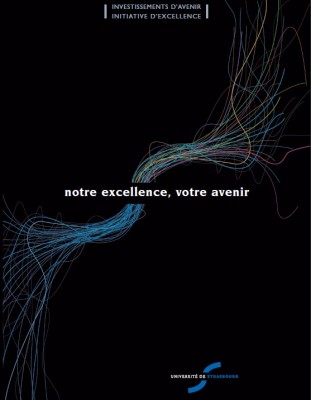
+ "Another trump card, compared to competitors, is that we have decided to define our excellence in "Dynamic" terms, i.e. regarding the Tools and Structures that we shall set up in order to make excellence evolve : F.ex., instead of simply saying that, today, (our) excellence is mainly in Chemistry, even if it might be true, but we say that, in 5 Years, using Chemistry's excellence, we give ourselves the necessary tools in order to give birth in good conditions also more excellent areas, in 10 or 15 Years, which are due at the Borders of Chemistry, such as in Biology (f.ex. together with Medicine), in Materials (i.e. together with Physics), in Social and Human Sciences, (f.ex. in BioEthics), etc., and this will allow to maintain and attract (more + various) Talents", Perrin pointed out.
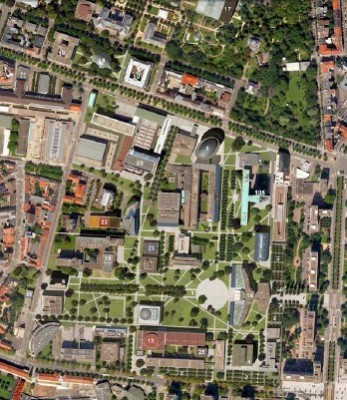
- "In fact, we are creating a kind of EcoSystem". Thus, "we don't prejudge about what kind of Species might evolve or eventually disappear inside that. But we bring f.ex. the Water, the Sun, we take care to have correct conditions, and afterwards, we shall see what will happen inside this EcoSystem", optimistically claimed President Beretz. "The whole logic behind these Initiatives for the Future is to create a good Ecosystem, a kind of ToolBox. But without prejudging exactly what kind of (concrete) work might be done with these Tools".
Reacting to a complementary question by a collegue against what might be a risk to "disperse and spend our Energy in various Multi-Disciplinatory efforts", as he claimed, and whether it might be better to immitate f.ex. some Private Clinics which focus only on what they can do well, (f.ex. Obstretics), droping averything else, Beretz naturally reassured him that, "any University is also, somehow, a cruel Darwinian world : Starting from BioDiversity, there will be, nevertheless, some Species which will emerge through a kind of Natural Selection , that we have, from times to times, to face. So, I don't have any concerns about that : Those who are the Best (equiped) usually emerge", he confirmed. "But we have, from times to times, to place under protection a small flower, which would, otherwise disappear, because others might eat it, together with its area", (as he characteristically observed).
- "But, it's not contradictory to speak about PluriDisciplinarity and Excellence", UniStra's President stressed. Certainly, all disciplines are equal, but we know that we are very good in some, and weaker in others. The main question is to find the Best Combination in order to be at the right Level on what we want", he added.
Distinguish 2 things
- "The great example accross the Globe is PluriDisciplinary : World's Great Universities as Cambridge (UK), Harvard (USA), etc. are Pluri, or even Toti-Disciplinary. F.ex. they have both Science of Religions and SupraMolecular Biology. And this succeeds", Beretz pointed out.
However, it's true that, also, "from the other side, there are also several Counter-Examples, where some institutions are rather Mono-Disciplinary : F.ex. in Sweden, the "Karolinska" in Stockholm, which fabricated a series of Nobel prizes in Medicine, and works well", he noted.
"Karolinska Institute" is, indeed a rare case of Mono-Disciplinary Higher Education structure, totally dedicated to Medicine, Pharmacology and Bio-Medical disciplines, (but, reportedly in all their parts, without exclusion), initialy created by the King at the Finnish War, in order to train War surgeons. It has the biggest number of research grants by the current Swedish system, but the smallest number of students. For many years it had produced (or attracted) many Nobel prize winners in the Past, during the Cold War period (1950ies-1980ies). It's considered to be 42st University in the World, but 10th Medical School.
- "However, there are many Variations, inside each one of these two categories, there is a large Diversity. But, our (Strasbourg's) system is Pluri-Disciplinary", he promised.
- In fact, "what really Defines a University is, precisely, to be InterDisciplinary !", topically reminded Perrin, remembering his Latin, (and almost his Ancient Greek : "Pan-Epistimion" = "All Sciences", closer to what Beretz called "Toti-Disciplinary")... "It implies that all Sciences mutually support eachother", he added. (I.e. practically reminding Aristote's construction of Philosophy as a Higher Intellectual level of abstract/general Ideas, made possible by being build on - and able to guide the perception of- various concrete examples taken from all specific Sciences of the Facts).
- "Poles of Excellence should not be opposed to PluriDisciplinarity, nor Education of Excellence to Mass Education : Both are part of a University's Mission, and a course can be excellent, and at the same time, massively transmitted to a large audience, (f.ex. medical trainees, in a Life-long-learning framework, etc), because we shouldn't oppose areas of Excellence and Transmission to a Socio-Economic tissue", he explained.
-----------
+ Concerning the "Great Items" or the "Big Poles", where the University has a role to play, we shouldn't also forget that a University lives inside an Environment, National, Regional, Local, and has a Responsibility, as someone who creates and distributes Knowledge, and that it has to exerce this responsibility together with its partners, which are the Local, Regional actors of Innovation, Economic, Social and Cultural Development. And it is based, for that purpose, on some very well organized people, such as Clusters, Development Agencies, etc. : All of them are natural partners for the University", he observed.
----------------------------------------------
In fact, "it's Strasbourg's University itsel which is an Investment for the Future, and justifies the mobilization of all the Regional Society's components, smiling concluded Gerard Bellitto, the Secretary General of the Top-level Think Tank "Gutenberg" circle, which brings together all the Nobel prizes and Academicians of Strasbourg's Alsace Region, and recently organized a Research Summit focused on UniStra's "attractivity", as he said to "EuroFora".
----------------------------------------------
+ Meanwhile, on another, different question on practical issues, "EuroFora" asked Beretz against Time and Energy consuming Bureaucracy :
- " Great Loan's Investments are meant to augment Productivity and Efficiency, on European/International level, mainly on Research but also elsewhere (f.ex. Students' Education, etc). But, from another side, there is also something that everybody knows : Everyday Bureaucracy, which, sometimes, goes against that. Do you think that you have enough means in order to master this problem, and overcome its counter-productive effects, so that, f.ex., even a simple re-insciption demarche (at UniStra, f.ex.in Doctoral Thesis, etc), doesn't become so cumbersome and a problem so serious (f.ex. by a useless waste of Time and Energy) that it might even threaten to harm victims' socio-professional activities. Because, sometimes, there are too much spanners thrown in the works... Can you succeed to simplify things ?", "EuroFora" questioned UniStra's President
- "Bureaucracy can be also generated" by our own actions, Beretz warned from the outset, choosing to start replying by picking up 1st this question.
- "But you are right : One of the Challenges in the Investments of the Future, is also to generate more Flexible systems. I. e. , it's not only the amount of money which is important, but also to succeed to arrive at a system which will operate in an Easier manner : More rigorously from the Qualitative point of view, since money must be well managed, but, as you said yourself, crossing through less Administrative Meanders which delay everything. It's about becoming very active, and able, f.ex., on concrete issues, to make a proposal faster"
- "F.ex., one of the systems that we wish to set up, together with the "Gutenberg circle" (Strasbourg's Top think-tank, composed out of Nobel Prize winners, Academicians, etc), is the so-called "Profesorship of Excellence", according to which, when there is someone (important) in the jobs' market (Scientists have also a market) who would like to come to Strasbourg, we (UniStra) should be able to make him/her a proposal very Fast. And, as you know, make something fast when it has to cross through Civil Servants it's not obvious...", he observed : F.ex. "a Relay System which allows the University's President or vice -President to put on the (negotiation) table a proposal with numbers in 15 Days" only. Now, "that will be possible", Beretz revealed, (particularly at a moment when various performant Research Labos are engaged in a process of renewing their leaders$hip, as, f.ex. in BioPhysics/Chemistry Materials' Research, etc.), citting it as "an example", among various others, of a will to overcome Bureaucracy and simplify things, in reply to "EuroFora"'s 2nd question.
+ Both in Strasbourg and at nearby Karlsruhe's Universities, "EuroFora" had recently crystal-clear occasions to observe the Huge Difference existing between a few conscious Civil Servants voluntarily working until late evening, often kindly helping even unanounced visitors to find their way through with useful, short, timely, simplified and pertinent infos, from some cushy job holders, who, on the contrary, search any hollow pretext in order to ...disappear from their office, except from only a few Hours' supposed "presence" on the spot, (f.ex. a strange secretariat in a promissing and active sector with huge History and several valuable Professors and with big potential, but obviously undermined by the scandalous Absenteism of a Secretary and her recently appointed Boss in a transversal Administrative service added without obvious utility, to interpose itself between Students and Teachers, bringing in more problems than solutions..
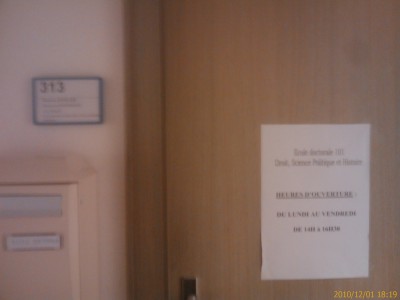
- "I don't want to make a Caricature about Universities' Bureaucracy, etc. But it's true that our Civil Servants' jobs, often are an advantage".. At any case, "it's natural that recruitment cannot go hee as in other ordinary cases. We must find the right solution between two extremes", Beretz concluded, pointing at the issue of the right choice of those to whom a University entrusts administrative responsibilities which may affect people's lives and a scientific community's future.
***
Giscard : EU Debates to revitalize Citizens' European Dream with EU People's Congres before 2015 ?
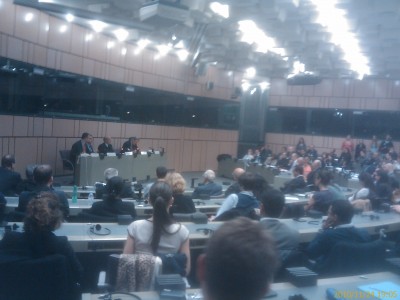
A currently existential EU problem is that Citizens don't yet look at EU Debates as such, but only through difforming mirrors of National debates, hindering to feel a "European Dream", while a new, decisive leap ahead, able to satisfy the need for more Democratic Legitimity and Mediatic Visibility of EU's Political leaders, could and should be organized, based on EU Parliament and links with National Parliaments, if they gathered together in Strasbourg to form a Congres of European People for the election of EU President from 2015, said Academician Valery Giscard d'Estaing, experienced former President of EU Convention and France, pointing at a key part of "EuroFora" project, which is to prepare EU debates on main European decisions affecting People's lives.
--------------
There is an obvious need for an intense effort of thinking, because, currently, the spirit of the public and most politicians is not in shape, and references to big EU Achievements disappeared from Political Parties' platforms. When, elsewhere, emerging powers thrive, it's unacceptable to see EU's current torpor, VGE denounced.
---------------------
Even if Europe had lost since long its 18th Century Dominant position in the World, nevertheless, it kept its Identity, thanks to a strong Millenary Culture, and succeeded, during the last 60 Years, to transform some among the most War-monger Nations into Members of a Peaceful Union, which reached the level of a Common Currency : the Euro, Faster than USA did in its History, VGE reminded.
But, EU wasted too much Time concerning the Political Unity of its Institutions, he noted, particularly after the 3 "No" to the French, Dutch and Irish EuroReferenda on a Draft EU Consitution (2005-2007), notoriously provoked mainly by Turkey's impopular EU bid, which alienated many EU Citizens afraid that some would let import inside Europe the serious violations of Human Rights, the undemocratic oppression, and its retrograde, underdeveloped Economy and Education, (where several Hundreds of Thousands of Children are totally excluded from School), while Political Parties are outlawed, elected representatives jailed, critical journalists harassed, persecuted or even murdered, with their killers escaping from just punishment, even Children's Torturers remaining totally unpunished...
Thus, after the Convention (for EU's Constitution, rejected in the 2005 EuroReferenda because of Turkey's controversial EU bid), follows a period of troubles, during which some re-Nationalize, while nobody speaks abut Europe's Future, and there isn't any Big Project : To put it in a nutshell : Nobody "Dreams" no more for Europe !", VGE denounced.
------------------------------
Even when, after EU Treaty's entry into force, we had to elect an EU President, and an EU Foreign Minister, etc., for the 1st time in History, instead of using that opportunity and present f.ex. 3 Candidates, with differend Programs, so that EU Citizens and Media People can hold Debates, etc., on the contrary, everything was "decided behind Closed Doors"...
-----------------------
All this is in Antithesis of the Founding Spirit of the EU Convention, which leaned towards Federalism, while EU, on the contrary, remains largely Inter-Governemental, VGE observed.
Since Maastricht (1993) EU comes closer to a kind of ConFederation. Insufficiently prepared to the Enlargments, (pushed by "an Enlargement Commissioner who wasn't good"), while UK Government stubornly refuses all serious augmentations of EU's powers, it slips towards a Community of Nations.
=> The greatest Danger, if this continues, is for the EU to be perceived from outside, as a Large Market, with a Weak Political Will, condemned to bargaining between Member States, where only the Biggest Countries are able to give some orientations, VGE warned.
-----------
After the draft EU Constitution was rejected by 2005's EuroReferenda, Lisbon EU Treaty was made by Jurists, and not by Elected Politicians taking into consideration Citizens' demands, contrary f.ex. to USA's Philadelphia congres, said VGE. The Language used is "not simplified", but on the contrary, difficult to understand by the People, for whom the Text becomes unreadable also by a series of references to previous EU texts, etc. Even the Symbols (Flag, Ode to Joy, etc) were sacrificed, he reminded.
However, the only "consolation" is that most of the substantial "Content" of the draft EU Constitution was saved : "If we open the Box, we see that the (institutional) Tools are inside", since what was Essential in the draft EU Constitution has been largely preserved.
These Tools are just starting to be used, prudently : F. ex. EU's External Action Service, facilitating the development of a strong Common Foreign and Security Policy, has been recently created ; EU's President van Rompuy and EU's Foreign Minister, Baroness Ashton, were apointed ; the Charter of Fundamental Rights was published ; etc.
In the foreseable Future, since it seems currently unthinkable to open any big new Reform process, EU has to advance by adequately using all the Tools preserved inside the Lisbon Treaty, VGE advised.
If the Financial Perspectives for the Post-2013 period might be fixed until the 2nd semester of 2012, (as VGE curiously believes), on the contrary, concerning the EU Council, its current (1st) President is the LAST to speak, after the Heads of State/Government, and this fact shows the need to take over EU's external Communication, according to Giscard.
------------------
- But, what is most Important is to "awake the European Conscience of our People", pointed out Valery Giscard d'Estaing.
- In this regard, the problem is that, until now, "we didn't have yet any European Political Space, but only National areas".
- That's why, EU is seen by Citizens, until now, through a difforming angle of National points of view, he denounced, speaking also for the Media. => Therefore, as solution could be to renew the project to "bring together the Peoples of Europe", VGE proposed.
Something that every other big region in the World already has (f.ex. USA, China, etc), he compared.
- "This (EU) Congress would become, progressively, a college for the future Election of EU's Leaders", and could "give Birth to a European Civil Society, because, as long as there isn't yet an EU Civil Society, EU cannot advance, Giscard stressed.
- "I believe that the Strong Voice of Europe's People can and must be heard" in this way, the former EU Convention's Chairman said firmly.
The new EU bod could be composed by some 900 MEPs from EU Parliament, as well as some MPs from the National Parliaments of EU Member States, totalling around 3.000 Persons.
This "Congress" of Europe's People could be organized in Strasbourg, (there where Napoleon had been elected on 1815 "Chancellor of Europe", as VGE's New Historic Book reminds).
No Legal Reforms were needed just in order to meet and speak, since no formal decision was scheduled, and even if all EU Member States didn't take part, it would be enough to advance with those Countries which are ready and willing to do so.
It could all start with the preparation of the Hearings, in view of Votes before final Decisions, of all Candidates' political programs for the Top Jobs of EU President (and EU Foreign Minister) created by Lisbon Treaty, which would stop being "invisible" to the Media, but, on the contrary, would acquire a much larger importance in the Future.
VGE's idea surprises by its simplicity, but also its far-reaching consequences.
It's not so far away from a differend hypothesis, that "EuroFora"s co-founder has been questioning since more than a Decade, as probably many other People dealing with EU/CoE issues, that in Strasbourg is concentrated almost everything that a European Government might need in the Future : A Parliament (EU's and CoE's Assemblies) ; a Court (CEDH) ; a Council of Ministers (f.ex. CoE's Committee of Ministers, EU Council's Offices inside EU Parliament's building, etc) ; a Media (ARTE Radio-TV, long before "EuroFora") ; an Army (EuroCorps) ; a Police/Security service (Shengen system) ; an Historic Symbol (Strasbourg's role in Franco-German Reconciliation, Human Rights' and Parliamentary Democracy's EU + CoE Capital, etc) ; enough Open space and green areas ready to welcome a brand New City which would rapidly emerge if it became a real EU "Capital", (etc).
But at least one important Factor seems yet lacking in this otherwise brillant VGE equation :
- Simply, the People, EU Citizens themselves, on the name of whom all this construction is build : As long as neither EU Parliament, nor various National Assemblies' Majorities, still wouldn't be elected by Voters on the basis of their preference for this or that Candidate for EU President's post, then, nobody could seriously pretend that their representatives (elected on the basis on pluralism and musiq's rentuin
Hastily Questioned by "EuroFora" in the few time available, except from a smile, VGE didn't seem to have a ready answer on that specific point... Not yet.
------------------------
VGE's speech was organized by Strasbourg University's PEAP, for "European pole on Public Administration", which, according to its Chairman Weber, is currently part and parcel of the projects presented in Paris by Strasbourg University's President Alain Beretz in order to be selected and supported by the French Government as a "pole of Excellence".
Obviously, Strasbourg, both Geopolitically, and by the personal Experiences accumulated since decades, has an important potential to emerge as a pole of excellence on Public Administration issues, from the Legal, Political Science, Historic/Sociological, Mediatic, a.o. points of view.
But, in order to become really effective, it all depends on whether the people who shall have any responsibility in this direction are conscious enough of the vital need to overcome some short-sighted former provincial and/or Bureaucratic counter-productive obstacles, which might undermine an otherwise unique, historic oppotunity for France and EU's Franco-German core, as well as all Europe, including, in particular, many hundreds of millions of EU Citizens and far beyond.
New French EU Minister Wauquiez to EuroFora: Debates+Vision on EU Future, but also concrete advances
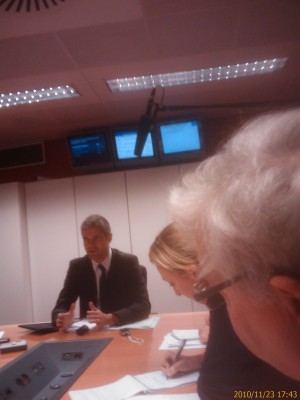
Well beyond the current need to start thinking how EU should be shaped after the Global Crisis, a Time will come to launch Debates on EU's Future and present adequate visions, particularly working together with the European Parilament, while also marking concrete advances, replied the New French EU Minister Laurent Wauquiez to "EuroFora"'s questions today, reacting to similar calls launched earlier this week by German Chancelor Angie Merkel, at nearby Karslruhe, (See), in additiion to French President Nicolas Sarkozy's famous deal with EU Commission's President Baroso to drop his initial opposal to EU - Turkey negotiations on condition that they don't touch upon core EU Membership issues and that an EU debate on what kind of Europe we want to have in the Future is prepared.
Both Sarkozy's initial idea and Merkel's recent eppeal eyed a wide scope of fundamental issues, spreading from Economic and Financial EU Governance, up to fhe fight against Bureaucracy and for Democratic decision-making by Politically responsible representatives elected by the People, as well as EU's Identity, Borders and Enlargement criteria, that they considered as incompatible with Turkey's impopular and controversia EU bid, etc, (Comp. pex. Sarkozy's February and July 2007 Strasbourg Speeches on Europe, as well as his August 2007 Speech to the Annual Ambassadors' Conference, etc).
- Referring to the "Momentum" and the "Post-2013 Vision" cited on Wauquiez's own initiative, "EuroFora" observed that German Chancellor Angie Merkel and the Head of the governing CDU/CSU Party in EU Parliament, Werner Langen, have just stressed, earlier this week at nearby Karlsruhe, that there is currently a need to be aware of a "Responsibility" for EU's Future, "inviting" to relevant "Debates", (See "EuroFora"'s previous NewsReport from the spot), and, given that this is a wish clearly expressed also by the French President Nicolas Sarkozy as early as since 2007, we asked him if he found that EU Parliament, with which he just declared his intention to work closely together, was a good tool in order to stimulate such kind of debates in the foreseeable future, or not.
- After having carefully asked some clarifications, Wauquiez agreed, in substance, that, as he said : - "You are right, ... the Time will come to reflect on, and spell out in our own words, our Vision for a real EU Community policy".
- Already, "certainly, a Question to raise is about the Europe that will exist after the (current Global Economic) Crisis : How could it be, what do we want, which are, for us, the main Characteristics on which we have to work".
- "But, we should be careful so that, while saying "Yes" for such Big Debates, at the same time we manage to make progress also on Concrete Issues", he warned.
In fact, already from the start, President Sarkozy's initiial idea was, to make a good use of fundamental General Issues, (such as "EU's Future", etc), in order to, precisely, deal with "concrete" questions, such as, f. ex. the development of an Economic and Monetary Governance, the struggle against Bureaucracy, EU's Identity and Borders, Turkey's impopular and controversial EU bid and the right Strategy for EU Enlargment, etc. (See his February and July 2007 Speeches in Strasbourg, as well as his August 2007 address to the Annual Conference of Ambassadors, in Paris. Recently, moreover, at the beginning of 2010, an appeal was launched for EU Parliament to debate also big, substantial issues of general interest to EU Citizens, advancing well beyond its indispensable Legislative work, as it was revealed after a visit to Paris by its President Jerzy Buzek.
German Chancellor Merkel also had, already in mind some concrete, topical issues, as, f.ex. the creation of a "Post-2013" stable Mecanism for EuroZone Funding to Member Countries which might need help to face Speculative Attacks in the Global Market, (as Wauquiez himself noted earlier), in addition to strong references in her Karslruhe statements aso to the Economic Development, Integration and EU's Identity, etc, (Comp. earlier "EuroFora"'s Pubication on the Bi-Annual Conference of the Governing CDU Party in Germany).
--------------------
- "To take a precise example : (the principle of) Reciprocity, which is a very great advance", Wauquiez went on to say, apparently referring to the latest EU Council's conclusion in Brussels, as it was presented also by its Chair, Hermann van Rompuy, and underined by President Sarkozy, concerning EU's position on the in-coming French Chairmanship of the G8 - G20 for the period extending from November 201O until November 2011.
- But, "now, what is also interesting, is to see, in concrete terms, how it will be expressed in (EU's and/or G8-G20's) Trade policy", he observed.
- In this regard, "we (France) are very receptive to some thoughts which are currenty put into circulation, as, f. ex., those which were initiated by (EU Commissioner now in charge of the Common Market) Michel Barnier, and (EU Commission's President, Jose) Barroso, (f.ex.) on Services..", etc. But, "afterwards, it remains to be seen how this will be concretely spelled out". "We must always pay attention on how things are concretely made", he concluded in reply to "EuroFora"s question.
As he had said earlier, speaking to Strasbourg's Journalists at EU Parliament, f.ex., even in cases such as Ireland's financial problems, for the EU "it's better to show to the Markets (not ony that EU knows how to face an Urgency) but also how we (EU) intend to follow up afterwards : It's important to present a vision", including a permanent mechanism, according to German Chancellor Merkel's legitimate wish for a "post-2013 vision".
--------------------------------------
Laurent Wauquiez also added earlier, that his general intention is to regularly try to both make the necessary negotiations on the topical EU issues of each Month, but also, not to forget to find fresh ways "to show Europe from a Positive point of view"', as, f.ex. with his 1st visit to the brand-new European School in Strasbourg, where young Students and Professors from various EU Countries meet and work together in a stimulating ambiance.
Young and active Wauquiez, that "EuroFora" had already met since the beginning of his Governemental career as early as since 2007, when he was Government Spokesman, after working also as State Secretary on Employment, has just been nominated by French President Sarkozy as new Minister for EU affairs, under the auspices of the new, but experienced Foreign Minister Michele Alliot-Marie, (comp. MAM's various statements to "EuroFora"s co-founder between 2002-2010).
EU Parliament is an important institution, particularly after Lisbon Treaty, which gave it important powers, and we want to work closely together, and "renew the Momentum" that was found between EU Parliament and French President Sarkozy during the 2008 French EU Chairmanship, he said to Strasbourg's Journalists, including "EuroFora", from the outset.
Careful to consult all main political tendencies, Wauquiez, after having "a long meeting" with Joseph Daul, President of the greatest EU Parliament's Group, that of ChristianDemocrats/EPP, he also met with the Chairmen of the Socialist and Liberal Groups, Martin Schlutz and Guy Verhofstadt, etc., as well as with EU Parliament and EU Commission's Presidents Jerzy Buzek and Jose Barroso, followed by many MEPs of various parties.
In addition to being a long-time collaborator to former EU Commission's vice-President Jacques Barrot, his family, as he reminded, has also some Belgian-Flamish and Swedish links, while he has also lived for some years in Austria, so that he can speak a conveniant German, in addition to French, Arab and English languages, something which can obviously be useful in the real practice of EU core Franco-German work.
But, while wishing that everyone is aware of our responsibilities for the need to adopt EU's 2011 Budget, (currenty blocked as long as EU Council doesn't yet accept EU Parliament's demand to start a debate on EU's long term Financial Perspectives, reportedly because of UK's and the Netherlands' refusal, as a Journalist observed), he also added that, as a matter of general Principle, we have to respect eachother's political positions, and EU's spirit implies that there are no winners or losers but that we always try to find a workable compromise.
EU Commissioner Georgieva to EuroFora : EU Humanitarian Volunteers may serve EU Disaster Response
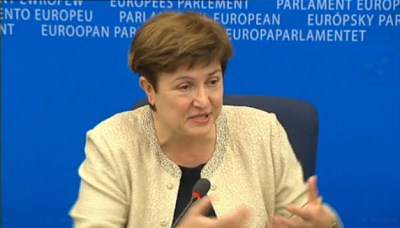
*Strasbourg/EU Parliament/Angelo Marcopolo/- Strong Popular Support and growing EU Citizens' trend to Volunteer to EU's Humanitarian action for Solidarity in the World, may usefuly be combined together with EU's Disaster Response Capacity, a kind of Civil Protection Force, mainly in order to help deploy on the spot the right ressources able to face or prevent/reduce major Hazards' risks anywhere it's needed to save Human Lives and socio-economic assets, replied EU Commissioner for International Cooperation, Humanitarian Action and Disaster Response, dr. Kristalina Georgieva, to a question raised by "EuroFora" at her Press Conference in Strasbourg, together with EU Parliament's Rapporteur on Humanitarian missions, MEP Michèle Striffler, vice-President of the Development Committee, on the occasion of EU Commission's Policy paper for the creation of a European Humanitarian Volunteers' Corps, dealing with Selection, Training and Deployment, at the eve of the 2011 "EU Year of Volunteering".
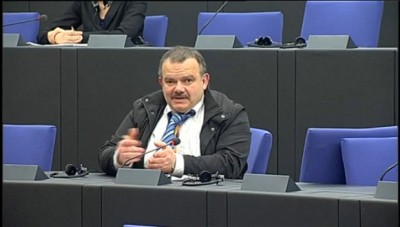
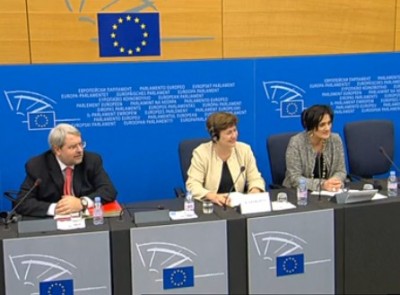
- "The proposal for the creation of a European Civil Protection Force, or Strong EU Disaster Response Capacity, is a separate proposal" that "the (EU) Commission approved a Communication on strengthening EU's Disaster Response Capacity on October 26th (2010), and, there, it has established 5 Key-Steps to get Europe to be better prepared, better organized, in a case of a Disaster, either inside or outside of our (EU's) boundaries, so (that) we (EU) can Plan, Train and Deploy in the most effective way", replied to "EuroFora" EU Commissioner Georgieva.
"And, these Steps are :
(1) "to prepare Scenarios for Disasters, in other words, to Anticipate what may be happening, inside or outside Europe",
(2) "to Map out our (EU's) Capacity, so that we (EU) can be at clear Deployment mode, at any point of Time, vis a vis this Scenario", and
(3) "to ask (EU) Member States, voluntarily, to set or stand by modules for deployment",
(4) "to have Transport and Logistic arrangements upfront, (i.e., in order) not to improvise when the Disaster happens, and"
(5) "to create a European Emergency Response Centre , by merging the Monitoring and Information Center, that currently exists, with the Humanitarian Emergency Response Team, that also currently exists, bring them together, and strengthen them, so (that) we (EU) are better equiped to Coordinate our Actions".
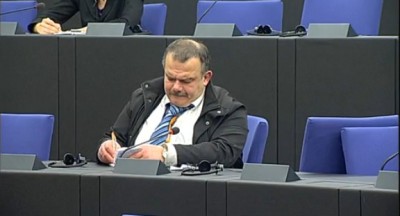
"That was a Separate Communication" from "this one, (new Communication of today, November 23, 2010), on the (EU) Humanitarian Aid Corps, (which) is about a New platform for Volunteering, and is a response to the Fact that more and more Europeans want to volunteer. And the Aim is to Direct this Desire to Volunteer towards Humanitarian actions, as the Lisbon Treaty prescribes", she explained.
-------------
- "The reason I gave you this Long Response on the 1st Proposal is that, potentialy, they could be linked", EU Commissioner agreed, smiling, with "EuroFora"'s suggestion.
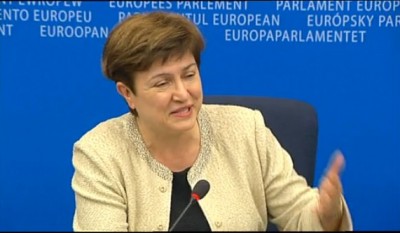
F. ex. : - "If we (EU) are deploying Volunteers in a way which is Post-Disaster, or, even better, in Disaster Risk-Reduction (i.e. preventive : Comp. "EuroFora"s conclusions on Summer 2010 a.o. Extreme Weather Events), then, the Humanitarian Corps and our (EU's) Civil Protection Capabilities, will connect", indeed, she stressed. Even if "this is a Link to make in Deployment, not in Policy design".
I.e. "Ultimately, what do we (EU) want ? We (EU) want, when a Disaster hits, and, unfortunately, it is happening more and more often, we (EU) want to get exactly the Right Assistance, to exactly the Right Place, with an Absolute Minimum of Delay. And that, we know, is based on both Professionals and Volunteers. In this sense, the New Scheme may complement our Disaster Response communication", Kristalina Georgieva concluded.
--------------------------------
While the Disaster Response EU Capacity is apparently focused on building mainly High-Tech capabilities, the Humanitarian Volunteer schema may usefuly complement it for on the spot action by motivated People, showing EU's "Human Face" in the World, Kristalina Georgieva stressed earlier.
8 out of 10 EU Citizens are in favor of EU Humanitarian Aid out of its borders, and more than + 23% have been involved in some kind of Humanitarian action, while there is a growing trend of Popular Desire for Citizens' contribution to such Solidarity operations, she observed.
After the present Policy Paper and further consulation and testing, EU Commission is due to present a final Legislative draft Bill on 2012, she anounced.
------------
+ Meanwhile, EU Commissioner Georgieva has recently anounced an augmentation for + 20 Millions € more in EU Humanitarian assistance to Sahel Countries, reaching in all 74 Millions € (136 Millions $) for a semi-Desert area extending from Senegal, Mauritania, Mali, and Burkina Faso to Algeria, Chad and Sudan, as well as Ethiopia, Somalia and Eritrea, but even Nigeria, Northern Mali and Cameroon.
She has also just urged EU Countries to respond to Haiti's demand for concrete help from Europe to fight against Cholera currently threatening fragile People Displaced since a Catastrophic Earthquake. This should be done particularly by sending Water Sanitation and Hygiene logistics, as well as Experts in Language and Training for Local populations. The move comes shortly after a Deadly Epidemic of South Asian origin curiously broke out in the Carribean island at Mexico's Gulf, which hadn't seen any cholera problems for more than a Century..
Even if, in this particular case, reportedly, the main need is not for more Money, as such, EU, in general, including f.ex. in Palestine, is by far the Biggest Donor in the World.
- Georgian President Saakashvili to EuroFora: AGRI Gas Ship Transport faster than Nabucco.
- German Green Party Paradoxes on Issues and CDU/CSU deals appear at its birthplace Freiburg
- Chancellor Merkel revitalizes German Christian party : EU's Best Economy strives for Values
- CoE chair Turkish FM Davutoglu skips EU Critics on Cyprus, Press Freedom, Torture: Multi-Culti aims
Main Menu
Home Press Deontology/Ethics 2009 Innovation Year EU endorses EuroFora's idea Multi-Lingual FORUM Subscribers/Donors FAQs Advanced search EuroFora supports Seabird newsitems In Brief European Headquarters' MAPs CoE Journalists Protection PlatformBRIEF NEWS
- 00:00 - 02.06.2021
- 00:00 - 18.10.2020
- 00:00 - 19.06.2020
- 00:00 - 18.05.2020
- 00:00 - 20.04.2020
- 00:00 - 02.02.2020
- 00:00 - 09.12.2019
- 00:00 - 27.11.2019
- 00:00 - 16.11.2019
Popular
- Yes, we could have prevented Ferguson riots says World Democracy Forum's Young American NGO to ERFRA
- Spanish People Elect CenterRIGHT Majority with 1st Party and Total of 178 MPs (6 More than the Left)
- Pflimlin's vision
- The European Athletic "Dream Team", after Barcelona 2010 Sport Championship Results
- Source Conseil d'Europe à ERFRA: Debatre Liberté d'Opposants à Loi livrant Mariage+Enfants à Homos ?
- Head of BioEthics InterGroup, MEP Peter Liese : "Embryonic stem cell research reaching its END" !?
- Spain: Jailed Turkish Terror suspect with Explosive,Drones,Chechen accomplices stirs Merah+ Burgas ?
- UN Head Ban Ki Moon at CoE World Democracy Forum : - "Listen to the People !"
Latest News
- EUOmbudsmen Conference 2022: Digital Gaps affect People's Trust threaten EF Project on EU Future ?
- French Election : Black Out on Virus, but Obligation for Fake 'Vaccines" Challenged
- Both French Presidential Candidates point at "Humanism" in crucial times...
- France : Zemmour = Outsider may become Game Changer in Presidential + Parliamentary Elections 2022
- PACE President Cox skips Turkey Worst (Occupation) case compared to Russia (DeMilitarisation) query
Statistics
Visitors: 59147141Archive
Login Form
Other Menu
(Opinion)
Paris - Bruxelles - Strasbourg, 2 septembre 2008

Le spectaculaire succès du Président français, Nicolas Sarkozy, (en tête de l'UE jusqu'a décembre), à obtenir de suite un cessez le feu inattendu entre la Russie et la Georgie, immédiatement après sa visite aux Présidents Medvedev et Saakashvili, au pire moment de tensions et heurts violents meurtieurs, qui avaient tué plusieurs innocents et provoqué le deplacement forcé de réfugiés par milliers, lui donne incontestablement une stature vraiment européenne :
A ses liens personnels bien connus avec l'Hongrie, la Grece, l'Italie ou l'Espagne, en sus de son amitié avec la chancelière allemande Merkel, son souhait d'essayer d'attirer l'Angleterre au jeu européen, etc, s'y ajoute, maintenant, une réussite, fragile certes, mais importante, au combat pour la Paix dans la "grande" Europe du général De Gaulle, "jusqu'a l'Oural", qui inclut naturellement la Géorgie, l'Arménie et d'autres pays, et ne peut exister qu'avec rapports de confiance et partenartiat stratégique avec la Russie.
Apres avoir réussi à debloquer la situation au Liban, (pays avec liens culturels historiques en Europe), lors du Sommet pour la Méditerranée à Paris, juillet dernier, (comme atteste maintenant le prémier accord d'echange d'Ambassadeurs avec la Syrie), Sarkozy activa maintenant une présidence française de l'EU bien entreprenante, à l'autre bout de l'Europe, à Moscou, où, contrairement à Napoléon, il a été reçu avec soulagement par le nouveau président russe, ami de l'experimenté Vladimir Poutine.
Cet homme politique rélativement nouveau au plan politique européen, avec une vision souvent critique ou même critiquée, à tort ou a raison, mais ambitieuse et concrete a la fois, qui aime s'adresser aux "Européens", comme il dit, n'est-il pas bien placé pour stimuler le fameux débat sur l' "Identité de l' Europe", qu'il a proposé au Parlement Européen récemment à Strasbourg, moins d'un an avant les Elections européennes de 2009 ?
En 2007, il a réussi à faire monter spectaculairement la participation citoyenne aux élections présidentielles en France, obtenant des récords historiques :
N'est-ce pas, justement ce que l' Europe a bésoin, apres 2 abstentions majoritaires sans précedent aux Elections de 1999 et 2004, et 3 "Non" aux réferenda pour ses institutions en 2005 et 2008, pendant une décennie trouble 1999-2008, (marquée surtout par la demande controversée de la Turquie d'entrer dans l'UE eclipsant les avancées de la Monnaie unique et de la liberté de circulation à l'espace Shengen, avec consequences mal-ressenties par la majorité des citoyens, bien au-délà des clivages du passé), qui a failli stopper l'integration européenne ?
Et cela, au moment même ou une globalisation galopante met l'Europe devant un choix crucial entre saut qualitatif en avant, apte à valoriser une occasion historique exceptionelle à se développer résolument, après les vaines destructions, querelles et tensions des guerres "chaudes" ou "froides" qui lui ont couté son rang dans le Monde, ou réculer définitivement en décadence...
Alors, que certains de nos amis à la Commission en Bruxelles, lui laissent au moins un peu d'espace de mouvement, et qu'ils l'aident à tenter d'insufler de l' oxygène frais et vivifiant aux rapports entre les citoyens et une Europe qui a manifestement bésoin et mérite de retrouver d'urgence un nouveau dynamisme populaire, avec un souci de réalisme mais aussi une vision passionante pour son avenir !
Après tout, les Etats Unis d' Amérique ne se sont pas faits à coups de bureaucratie, nécessaire et utile, mais manifestement insuffisante : Sans l'impulsion d'hommes politiques originaux, d'intellectuels vraiment engagés, et, surtout, sans l'enorme énergie émanant de la conscience d'enjeux à la fois pratiques et grandioses, bien resentis par des millions de citoyens, stimulant leur adhésion active comme pioniers d'un nouveau avenir commun à construire, ils seraient encore une ex-colonie périphérique, affaiblie par stériles divisions, passif et impuissant spectateur des convulsions tragiques d'un Monde à la dérive...
Que les vrais "européens" ré-lisent au moins les fameux discours historiques sur l' Europe d'un Sarkozy bien inspiré à Strasbourg, aussi bien avant qu'après avoir gagné les élections françaises, le 21 février et le 2 juillet 2007, après son 1er sommet des Bruxelles, qui a adopté le nouveau Traité de l'UE en conclusion de la presidence allémande : Bonnes lectures pour cet été 2008, afin de préparer l' avenir qui s'ouvrira (ou fermera) à partir des élections européennes de 2009.
Peut-etre revelera-t-il plus, en ce sens, lors de ses 2 discours-debats prochains avec les eurodeputés, prévus lors des sessions plenières du Parlement Européen a Strasbourg en octobre et décembre 2008...
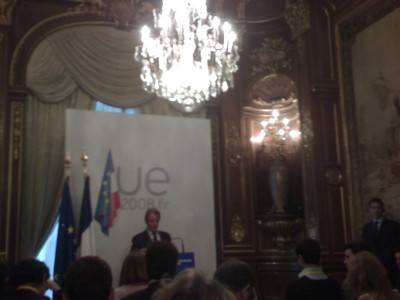
Foreign Minister Bernard Kouchner had already unveiled President Sarkozy's intentions, during a particularly "hot" Press Conference in Paris, where he faced some's insistance for "sanctions", with a call for "a common EU stance". In the meanwhile, he was consulting "all these days" most of his EU, Russia and Georgia counterparts, (as Sarkozy's Spokesman, P-J. Henin confirmed to "EuroFora"). This allowed him to obtained the desired result, as EU Chairman, at a short, exceptional EU Summit in Brussels, afterwards.
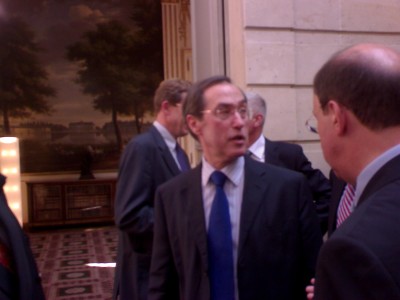
But, Sarkozy's No 1 official, Presidential palace's Secretary General Claude Gueant, active at Elysee during the 2008 Ambassadors' Conference, (together with his Top Diplomat, the experienced David Levitte), is well known for having an overall view : A link with 2009 EU Elections at the horizon ?













